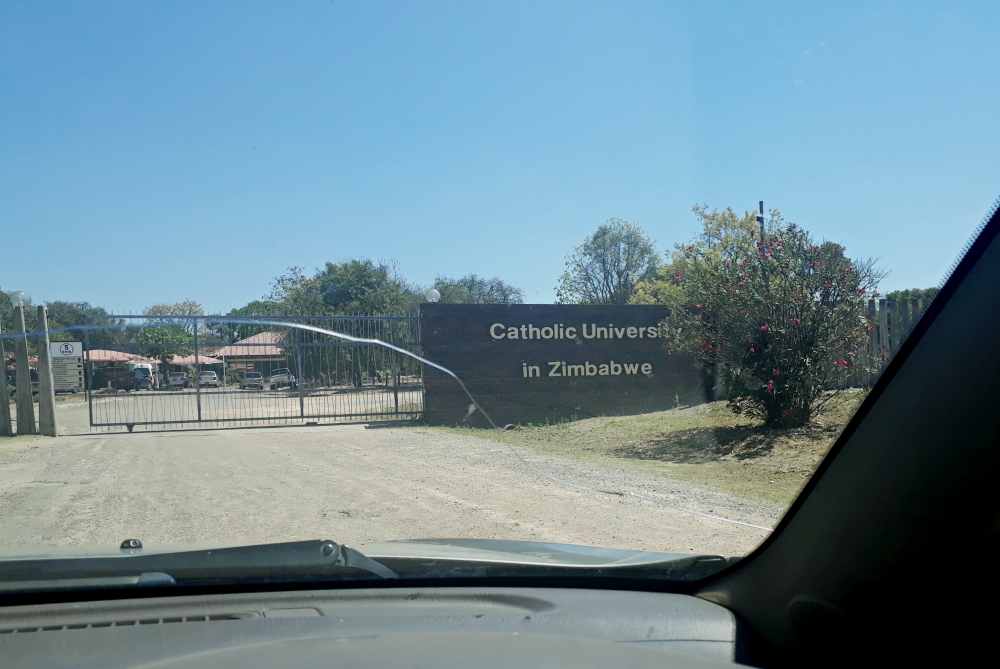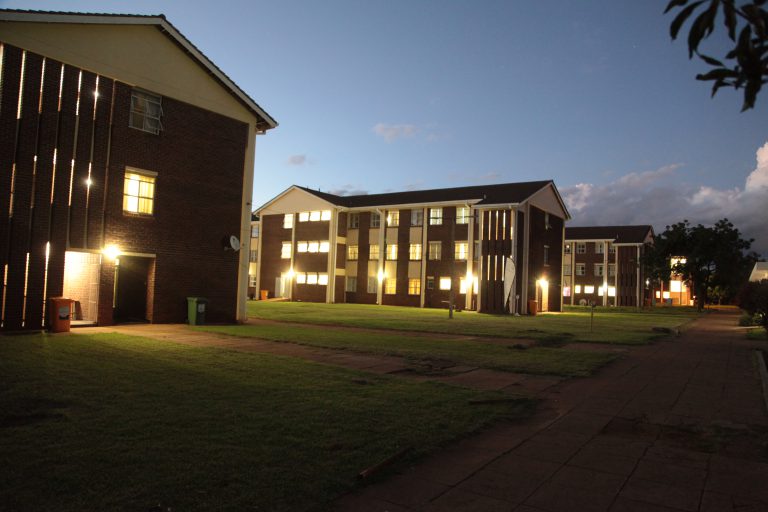Discover Zimbabwean education: Catholic University, Harare Institute of Tech, and Bindura Univ. Learn about admissions, fees, courses, and shaping futures.
General information
| Alternative names | CUZ |
|---|---|
| Founded | 1999 |
| Motto | Pro Deo et Sapientia For God and wisdom |
Location and contacts
| Address | Harare Zimbabwe |
|---|---|
| City population | 2,150,000 |
| Phone | +263 (4) 705 368 |
| Fax | +263 (4) 706 911 |
Introduction:
Established in 1999, the Catholic University of Zimbabwe (CUZ) stands as a beacon of higher education in the bustling metropolis of Harare. As a private institution officially recognized by the Ministry of Higher and Tertiary Education, Innovation, Science and Technology Development of Zimbabwe, CUZ is deeply rooted in the Christian-Catholic tradition, offering a range of academic programs and opportunities for personal and intellectual growth. In this article, we explore the ethos, offerings, and impact of the Catholic University of Zimbabwe.
Mission and Values:
The Catholic University of Zimbabwe is guided by a commitment to academic excellence, ethical leadership, and social responsibility. Grounded in the principles of Christian faith and Catholic teachings, CUZ seeks to cultivate a community of scholars and learners who are dedicated to the pursuit of truth, justice, and service to others. Through its programs and initiatives, the university aims to empower students to become compassionate, ethical leaders and agents of positive change in their communities and beyond.
Academic Programs:
At the Catholic University of Zimbabwe, students have access to a diverse range of academic programs leading to bachelor’s degrees in various fields of study. From humanities and social sciences to business, law, and theology, CUZ offers a comprehensive curriculum designed to foster critical thinking, creativity, and professional competence. With a focus on holistic education and practical skills development, the university prepares students for success in their chosen careers and equips them with the knowledge and skills to make meaningful contributions to society.

Student-Centered Learning:
At CUZ, students are at the heart of the learning experience, with personalized support and mentorship provided by dedicated faculty and staff. Small class sizes, interactive teaching methods, and hands-on learning opportunities ensure that students receive individualized attention and guidance throughout their academic journey. Whether in the classroom, laboratory, or fieldwork setting, CUZ fosters a dynamic and engaging learning environment that encourages collaboration, creativity, and intellectual curiosity.
Facilities and Resources:
The Catholic University of Zimbabwe provides a range of academic and non-academic facilities to support student learning, research, and extracurricular activities. These include state-of-the-art classrooms and laboratories, a well-stocked library, computer labs, and recreational facilities. Additionally, CUZ offers student support services such as counseling, career guidance, and academic advising to help students navigate their academic and personal development.
Community Engagement and Outreach:
As a socially conscious institution, CUZ is deeply committed to community engagement and outreach, providing opportunities for students to apply their knowledge and skills in real-world settings. Through service-learning projects, internships, and community service initiatives, students have the opportunity to make a positive impact in the local community and address pressing social issues. By fostering a spirit of compassion, empathy, and social responsibility, CUZ prepares students to be engaged citizens and compassionate leaders in a diverse and interconnected world.
Bachelor’s Degrees:
- Business
- Computer Science
- Economics
- Liberal Arts & Social Sciences
Master’s Degrees:
- Business
- Economics
- Liberal Arts & Social Sciences
Conclusion:
As it continues to uphold its mission of excellence, integrity, and service, the Catholic University of Zimbabwe remains dedicated to nurturing the minds and spirits of its students and empowering them to become leaders of character and competence. With its strong academic programs, supportive learning environment, and commitment to social justice, CUZ is poised to make a lasting impact on the lives of its students and the communities they serve. As it looks to the future, the Catholic University of Zimbabwe remains steadfast in its commitment to building a brighter, more compassionate world for generations to come.
Harare Institute of Technology: Academic Requirements, Fees, and Courses.
Introduction:
Established in 1988, the Harare Institute of Technology (HIT) stands as a beacon of higher education in Zimbabwe. Situated in the vibrant urban landscape of Harare, HIT has been a pioneering institution, offering quality education to aspiring students. This article aims to provide an overview of HIT’s academic offerings, admission policies, facilities, and recognition in the global educational landscape.
General information
| Alternative names | HIT |
|---|---|
| Founded | 1988 |
| Accreditation | Zimbabwe Council for Higher Education (ZIMCHE) |
| Motto | Success through innovation |
| Colors | blue, golden yellow |
Location and contacts
| Address | P.O. Box BE 277 Belvedere Harare Zimbabwe |
|---|---|
| City population | 2,150,000 |
Admission Information:
HIT prides itself on being an inclusive institution, admitting both men and women. With a selective admission policy, the institute evaluates applicants based on their past academic records and grades. International students are welcomed to apply, fostering a diverse learning environment. The institution boasts an acceptance rate range of 70-79%, indicating its commitment to maintaining academic standards while providing opportunities for a wide array of students.
How to apply to the university
- Choose a program
- Press “Apply now” button
- Send an application form
- Complete admissions tasks
- Go to study
To apply to Harare Institute Technology follow these steps. To get more information about the university and the admissions process, you can use the live chat to contact a university representative.

Required documents for admission
When applying for admission to Harare Institute Technology in Zimbabwe you should prepare all required documents. Request a list of necessary documents directly from a university, as it may vary for different countries. Using our live chat, you can also ask for sample documents.
- Research proposal outline (MA, PhD)
- Declaration for financial support
- Letters of reccomendation (MA, PhD)
- Family Details
- Student visa
- Proof of fee payment
- Application fee
- Medical Certificate
- TOEFL Certificate
- Online Application form
- Resume/CV (graduate, postgraduate)
- Health and Life Insurance
- Passport
Facilities and Services:
HIT’s commitment to holistic education is reflected in its provision of comprehensive facilities and services. From a well-equipped library to modern housing facilities, the institute ensures that students have access to essential resources for their academic journey. Sports facilities, study abroad programs, online courses, and administrative services further enhance the student experience, fostering personal and academic growth.
Tuition
The tuition table for Harare Institute of Technology gives an overview of costs but prices are approximate and subject to change and don’t include accommodation, textbooks, or living expenses. The costs of programs might differ significantly for local and international students. The only source of truth for current numbers is the university’s official website.
| Program | Tuition Cost (per semester) |
|---|---|
| Bachelor of Technology in Computer Science | USD 1,500 |
| Bachelor of Technology in Electrical Engineering | USD 1,800 |
| Bachelor of Technology in Mechanical Engineering | USD 1,800 |
| Bachelor of Technology in Industrial and Manufacturing Engineering | USD 1,800 |
| Bachelor of Technology in Chemical and Process Systems Engineering | USD 1,800 |
| Bachelor of Technology in Information Security and Assurance | USD 1,500 |
| Bachelor of Technology in Applied Biology and Biochemistry | USD 1,500 |
| Bachelor of Technology in Entrepreneurship and Business Management | USD 1,500 |
Harare Institute of Technology faculties and divisions
| School : Business Management Sciences | Accountancy, E-Business/Commerce, Finance |
|---|---|
| School : Engineering and Technology | Chemical Engineering, Electronic Engineering, Industrial Engineering, Polymer and Plastics Technology, Production Engineering |
| School : Industrial Sciences and Technology | Biotechnology, Food Technology, Pharmacology |
| School : Information Science & Technology | Computer Science, Information Technology, Software Engineering |
Recognition and Accreditation:
In the realm of higher education, recognition and accreditation are paramount. HIT holds institutional recognition and accreditation from the Ministry of Higher and Tertiary Education, Innovation, Science, and Technology Development of Zimbabwe. This accreditation, obtained in 2005, underscores HIT’s adherence to national standards and commitment to academic excellence. Additionally, the institution holds programmatic accreditations from esteemed bodies such as the Zimbabwe Council on Higher Education (ZimCHE), further validating the quality of its programs.
Conclusion:
The Harare Institute of Technology stands as a testament to Zimbabwe’s commitment to advancing education and innovation. With its rich academic offerings, inclusive admission policies, state-of-the-art facilities, and esteemed recognition, HIT continues to shape the future leaders of Zimbabwe and beyond. Aspiring students seeking a transformative educational experience will find HIT to be a nurturing environment where academic excellence thrives.
Bindura University: Shaping Futures Through Education
Institutional Overview:
Established in 1996, Bindura University of Science Education (BUSE) is a public, non-profit institution located in the vibrant city of Bindura, Mashonaland Central, Zimbabwe. With an additional campus in Harare, BUSE is officially recognized by the Ministry of Higher and Tertiary Education, Innovation, Science and Technology Development. The university’s commitment to academic excellence and accessibility is evident through its diverse range of degree programs spanning pre-bachelor’s to doctoral levels.
General information
| Alternative names | BUSE |
|---|---|
| Founded | 1996 |
| Accreditation | Zimbabwe Council for Higher Education (ZIMCHE); Ministry of Higher and Tertiary Education |
| Motto | Promoting Science for Human Development |
Location and contacts
| Address | Private Bag 1020 741 Chimurenga Road (off Trojan Mine Road) Bindura, Mashonaland Central Zimbabwe |
|---|
Admission Information
Applying for admission is the first step towards achieving students’ academic and career goals and accessing the many opportunities and resources that a university has to offer.
Gender Admission
This institution admits Men and Women (coed).
Admission Selection
Has Bindura University of Science Education a selective admission policy? Yes, based on students’ past academic records and grades.
Admission Rate
Bindura University of Science Education’s acceptance rate range is 90-99% making this institution a least selective higher education institution.
International Students Admission
International students are welcome to apply for admission at this institution.
Admission Office
Admissions Office, Registry Dept., Bindura University of Science Education, P Bag 1020
Bindura 263 66 210 7531-6 / 66 2107621-4
Size and Profile:
- Total Student Enrollment: 9,000-9,999 students
- Total Faculty/Academic Staff: 300-399
- Control Type: Public
- Entity Type: Non-profit
- Campus Setting: Urban
- Academic Calendar: Semester-based
Recognition and Subject Rankings:
- EduRank:
- #6905 in the World
- #285 in Africa
- #6 in Zimbabwe
- #1 in Bindura
- #1531 for Forestry
- Research Profile:
- Publications: 1,142
- Citations: 8,318
- Subject Rankings: Spanning various disciplines including Environmental Science, Biology, Political Science, Engineering, and more.
Facilities and Services:
BUSE provides a range of academic and non-academic facilities and services, including libraries, housing, sports facilities, financial aid, study abroad programs, and administrative support.
Bindura University of Science Education faculties and divisions
| Faculty : Agriculture and Environmental Science | Agricultural Economics, Animal Husbandry, Crop Production, Environmental Studies |
|---|---|
| Faculty : Commerce | Accountancy, Banking, Economics, Finance, Human Resources, Marketing, Protective Services |
| Faculty : Science | Biological and Life Sciences, Chemistry, Computer Science, Geography, Health Sciences, Mathematics, Physics, Sports |
| Faculty : Science Education | Curriculum, Educational Sciences, Mathematics Education, Science Education |
| Faculty : Social Sciences and Humanities | Communication Studies, Government, Modern Languages, Peace and Disarmament, Social Work |
| Postgraduate Diploma | Applied Mathematics, Education, Statistics, Teacher Training |
|---|---|
| Master Degree | Analytical Chemistry, Biology, Business Administration, Curriculum, Forestry, Government, Inorganic Chemistry, International Relations and Diplomacy, Leadership, Peace and Disarmament, Physics, Science Education |
Tuition Fees
This Bindura University of Science Education’s Tuition Fees Range Matrix is divided into 2 types of students, local and international students, and 2 degree levels, undergraduate and postgraduate degrees, and aims to help students to have an approximate idea of the yearly tuition range they might expect to pay at Bindura University of Science Education.
| Student type | Undergraduate | Postgraduate |
|---|---|---|
| Local students | 0-999 US$ (0-910 Euro) | 1,000-2,499 US$ (910-2,280 Euro) |
| International students | 2,500-4,999 US$ (2,280-4,555 Euro) | 2,500-4,999 US$ (2,280-4,555 Euro) |
Conclusion:
Bindura University of Science Education stands as a pivotal institution in Zimbabwean higher education, fostering academic growth and research excellence. With its inclusive admission policies and commitment to student success, BUSE continues to shape the future leaders of tomorrow across diverse fields of study. For further information on programs, admissions, and institutional offerings, prospective students are encouraged to contact the admissions office or visit the university website.
Add a Comment
You must be logged in to post a comment.

